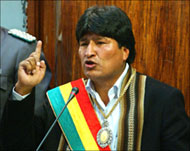Entered into the database on Sunday, January 29th, 2006 @ 12:18:13 MST
Evo Morales, the Bolivian president, has appointed a coca grower to
oversee his country's efforts to combat drug trafficking. During a trip to the heart of Bolivia's coca-growing region, Morales announced
the appointment of Felipe Caceres, a co-founder of his Movement Toward Socialism
party, to the job. "A coca farmer is going to be in charge of the fight against drugs,"
Morales said, wearing a hat weaved of coca leaves and drawing loud applause
from the assembled crowds, many
of them coca farmers. In recent years, the head of Bolivia's anti-drug efforts has worked closely
with Washington, which spends about $150 million a year on coca-eradication
programmes in the country. But Morales, who took office last Sunday, first rose to political prominence
as the leader of the country's coca farmers, and led protests against US-backed
eradication efforts. He said the struggle to preserve the legal growing of the plant was deeply
tied to his political party, known popularly by its initials, MAS. "MAS
was born from the coca leaf," he said. "We will never be separated." The cultivation and sale of small amounts of coca is legal in Bolivia but the
United States says that additional production of the plant - the key ingredient
of cocaine - eventually ends up on illegal drug markets. Herbal teas Bolivian law allows 30,000 acres of legal coca cultivation. The plant is prized
by indigenous farmers for traditional medicinal uses and herbal teas. Indians in Bolivia chew coca as a mild stimulant to ward off hunger and altitude
sickness, and Morales has said he wants to increase production of the leaf for
use in medicines, toothpaste and soft drinks. Morales, who sums up his stance on fighting drugs as "No to zero coca,
but yes to zero cocaine", argues that the aggressiveness of the US campaign
has stimulated illegal drug production.
